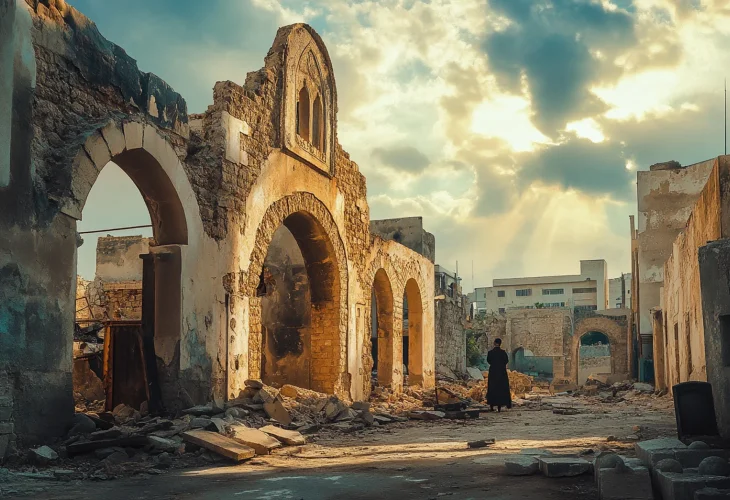The Jewish Legacy of Tripoli: A Struggle Against Time
What the Nazis couldn’t destroy, others did. Jews were told it was a 'temporary evacuation,' but it was the end of a centuries-old community in Tripoli.

The Jews of Tripoli are a vibrant and spirited community whose cultural roots run deep in Israel today, from their unique language and expressions to culinary delights like couscous, mafroum, chraime, and harissa. However, not many know that the Jewish community in Tripoli is one of the world's oldest, predating Ashkenazi and Sephardi communities. There was a significant Jewish presence in Tripoli possibly even before the destruction of the First Temple. After the Second Temple's fall, the Romans relocated many Jewish exiles to Libya, known to them as "Cyrene." During the Diaspora Revolt against the Romans, the Jews of Cyrene played a major role, consistently noted in history for their strength and unwavering loyalty to Jewish traditions.
During the Holocaust, Italy initially controlled Libya, followed by Nazi Germany. The Jews of Libya suffered intensely under Nazi occupation; racial laws were imposed, and a concentration camp named Tripolitania was established, where Jews were sent. In 1942, these laws were tightened. About 2,600 Jews were sent to a desert concentration camp called Camp Jado, 235 km south of Tripoli. They endured immense hardships, with many dying from brutality, malnutrition, and diseases that spread in the cramped, inhumane conditions of the camp.
In 1943, Libya fell under direct German control, and Jews were immediately deported to Bergen Belsen in northern Germany and the Innsbruck Reichenau camp in Austria. These Libyan exiles found themselves in a death factory, unable to understand the language, unprepared for the freezing European climate, and unaware of their fates. They suffered greatly, with many perishing.
After the war, a significant issue arose when the Jews of Libya were not recognized as Holocaust survivors. What seems obvious today was not back then—they weren't Ashkenazi, they didn't come from Europe, so what connection did they have to the Holocaust? They received no reparations, nor the respect and care they deserved. Shockingly, only in 2010 were Libyan Jews officially recognized as Holocaust survivors!
The community continued in Tripoli post-Holocaust, but following the Six-Day War, the Libyan authorities completely dismantled the community. Not a single Jew remained in Tripoli. What the Nazis couldn't achieve, the local Arabs did, by announcing a "temporary evacuation" and simply expelling them from their homes. Only when they were far from the region did they realize this evacuation was permanent, and they were never allowed to return to Tripoli.
Two years later, in 1969, the deranged Muammar Gaddafi rose to power in Libya following a military coup. He confirmed the expulsion of the Jews and worked to erase every Jewish trace by demolishing homes, synagogues, and flattening cemeteries to build highways and high-rises over them. Thus, the Jews of Tripoli have lived in Israel for many years, with strong yearnings for their origins and a dignified ancient heritage but knowing everything has been erased forever.
A few years ago, following the "Arab Spring," Gaddafi's regime was overthrown, and David Gerbi, born and raised in Libya, founded the "Organization for Libyan Jews" to try and preserve some of the Libyan and Tripolitanian heritage. Tripoli had thirty-seven synagogues (!), of which only one survived. This impressive building was the Dar Bishi Synagogue, where great sages and mystics of Tripoli prayed. It stood abandoned for decades, until recently when the Libyan government decided to renovate it and turn it into an Islamic library. David Gerbi managed to visit and document the renovations, calling upon cultural institutions worldwide to influence the Libyan government to stop this plan and preserve the synagogue as a Jewish memorial site. His appeal included photographs of the synagogue in its former glory before the expulsion and images of the ongoing renovation.
Aside from the synagogue, Gerbi also noted the dire state of the old Jewish cemetery, writing: "During my visit to Tripoli, I was horrified to see children playing over the ruins of the Jewish cemetery while the bones of our beloved deceased protrude from the rubble." In this case, it seems impossible to prevent the physical erasure of the cemetery. Therefore, Gerbi's intriguing idea was to create a virtual cemetery, allowing people to "visit" the burial site online. Each individual could virtually reach their loved ones' burial plots and pray on their memorial days. To this end, Gerbi utilized old and new photographs, data inputted by the families of the deceased, and more.
It's tragic how attempts were made to erase Jewish history, yet uplifting how resilient and thriving the future of the Jewish people remains, despite ongoing and past attempts: "No weapon forged against you shall succeed."

